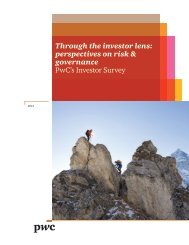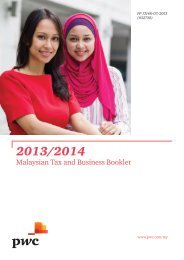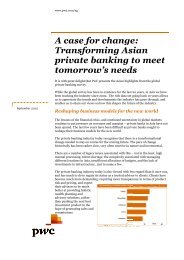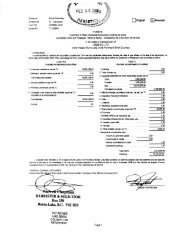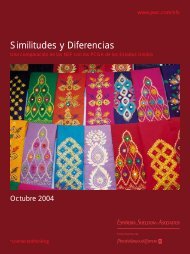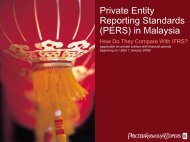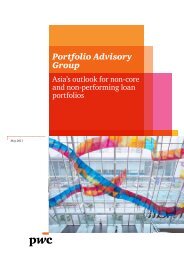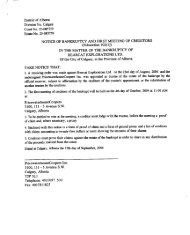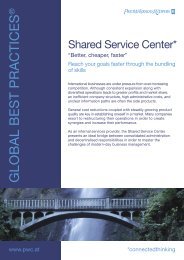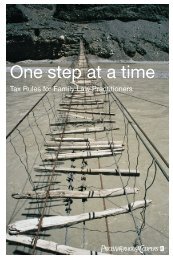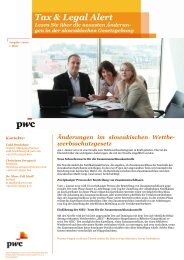TLS Newsletter 11 marzo 2011 - PwC
TLS Newsletter 11 marzo 2011 - PwC
TLS Newsletter 11 marzo 2011 - PwC
Create successful ePaper yourself
Turn your PDF publications into a flip-book with our unique Google optimized e-Paper software.
Abuso del diritto e deposito<br />
“simulato” di beni provenienti da<br />
Paesi extra-Ce: ulteriori considerazioni<br />
alla luce della sentenza<br />
Weald Leasing<br />
(Francesco Pizzo)<br />
Come già analizzato in occasione dell’articolo pubblicato<br />
sulla <strong>TLS</strong> <strong>Newsletter</strong> n.12/2010 (“Abuso del diritto<br />
e deposito simulato di beni provenienti da paesi extra<br />
- CE”), l’Agenzia delle Dogane è intervenuta sul concetto<br />
di Deposito IVA soffermandosi sui c.d. Depositi simulati.<br />
In questa sede vengono effettuate ulteriori considerazioni<br />
alla luce della recente “Sentenza Weald Leasing”,<br />
C-103/09, della Corte di Giustizia Europea, del 22<br />
dicembre 2010, avente ad oggetto alcune operazioni di<br />
leasing, effettuate da un gruppo societario, che denotavano,<br />
fra gli altri, lo scopo di differire l’onere fiscale<br />
dell’IVA indetraibile. Pronunciandosi sul contrasto di tali<br />
operazioni con la Direttiva IVA, la Corte si è soffermata<br />
a rimarcare i presupposti e le caratteristiche di una condotta<br />
abusiva.<br />
Sul punto, ad avviso dell’Agenzia delle Dogane, configurerebbe<br />
abuso del diritto l’introduzione della merce<br />
in deposito senza una sottostante ragione economica,<br />
tranne l’intento di evitare il pagamento dell’imposta in<br />
dogana.<br />
Secondo l’Agenzia, il deposito simulato configura<br />
l’ipotesi di abuso del diritto in quanto “si pone in essere<br />
un’operazione, senza una valida ragione economica, il<br />
cui scopo è essenzialmente l’ottenimento di un vantaggio<br />
fiscale”.<br />
Nel caso dei depositi IVA, tuttavia, il contribuente, che<br />
effettua l’immissione in libera pratica della merce importata<br />
introducendola nel deposito, non ottiene un vantaggio<br />
fiscale bensì finanziario consistente nella possibilità<br />
di differire il momento di assolvimento dell’imposta<br />
all’estrazione dei beni dal deposito. Tale vantaggio si tradurrebbe,<br />
pertanto, in un miglioramento della gestione<br />
della tesoreria e non in un beneficio fiscale inteso come<br />
indebito risparmio di imposta. Lo scopo del contribuente,<br />
in questa fattispecie, è quello di razionalizzare la<br />
propria gestione finanziaria, non essendovi una pratica<br />
abusiva nel differimento dell’assolvimento dell’imposta<br />
ad un momento successivo, bensì una scelta di “conduzione<br />
degli affari fra più possibili opzioni ammissibili<br />
sotto il profilo giuridico” (si veda, su questo aspetto,<br />
Commissione Tributaria Provinciale di Pisa, n. 243 del 14<br />
Dicembre 2009).<br />
Nella pronunzia relativa al caso Weald Leasing (sentenza<br />
22 Dicembre 2010, Causa C-103/09) la Corte di Giustizia<br />
esclude che un mero beneficio finanziario, purché<br />
l’imposta venga integralmente corrisposta, costituisca un<br />
indebito “vantaggio fiscale”, contrario alla direttiva IVA.<br />
Abuse of law and “simulated”<br />
storage of imported goods:<br />
further considerations following<br />
to the Weald leasing decision<br />
(Francesco Pizzo)<br />
As already analyzed in the article published on <strong>TLS</strong> <strong>Newsletter</strong><br />
no. 12/2010 (“Abuse of Law and VAT warehouse:<br />
“simulated” storage of imported goods”), the Custom<br />
Agency intervened on the concept of VAT warehouse, with<br />
particular reference to the so-called “simulated” VAT warehouses.<br />
Further comments follow on the basis of the recent<br />
decision of the “Weald leasing” case, C-103/09, by the<br />
European Court of Justice, released on December 22, 2010.<br />
The case referred to some leasing transactions carried out<br />
by a group of companies, with the aim, among others, of<br />
deferring and distributing the non-deductible VAT cost. In<br />
the case at hand, saying over the contrast of such transactions<br />
with the VAT directive, the Court pointed out the<br />
elements and characteristics of abusive behaviours.<br />
According to the Custom Authorities the introduction of<br />
the goods into the warehouse without any real economic,<br />
except for avoiding the VAT payment at the custom, would<br />
set up an abuse of law.<br />
According to the Custom Agency, the “simulated” VAT warehouse<br />
set up a hypothesis of “abuse of law”, since a transaction<br />
is carried out without any valid economic reason,<br />
with the essential aim of obtain a tax advantage.<br />
In the case of Vat warehouses, however, the taxpayer that<br />
release the goods into free circulation, does not obtain a<br />
tax advantage, but rather a financial one which consist in<br />
the possibility of deferring the tax point at the moment of<br />
the extraction of the goods from the warehouse. Such an<br />
advantage would result in a financial improvement, which<br />
does not constitute an undue tax benefit. The taxpayer’s<br />
aim, in such a case, is to rationalize its cash management,<br />
and the mere deferral of the tax point does not represent<br />
an abusive behavior, but a “legitimate management choice<br />
among different acceptable options from a legal point<br />
of view” (see Tax Court of Pisa, no. 243 of December 14,<br />
2009).<br />
In its decision concerning Weald Leasing case (dated December<br />
22, 2010, Case C-103/09) the Court of Justice itself<br />
excluded that a mere financial benefit, given that VAT is<br />
paid in full, constitute an undue “tax advantage”, contrary<br />
to the VAT directive.<br />
<strong>11</strong> <strong>TLS</strong> <strong>Newsletter</strong> n° 3 Anno 20<strong>11</strong>



